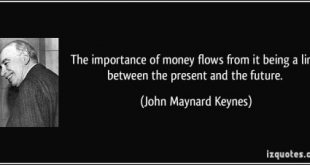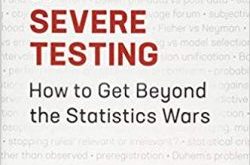Det var en gång en familj Frihet är något som många av oss lärt oss ta för givet. Därför är det desto viktigare att radions P1 Dokumentär visar hur fel vi har. Hedersförtryck tvingar dagligen döttrar och söner att avstå från sin oförytterliga rätt att själva bestämma över sina liv. Frihet är något vi måste återerövra dag efter dag, år efter år. Är det värt att ta den kampen? Ja. Alltid. Mot dem som i vårt samhälle vill tvinga andra att leva efter deras egna...
Read More »Is money — really — neutral in the long run?
Is money — really — neutral in the long run? Paul Krugman has repeatedly over the years argued that we should continue to use neoclassical hobby horses like IS-LM and Aggregate Supply-Aggregate Demand models. Here’s one example: So why do AS-AD? … We do want, somewhere along the way, to get across the notion of the self-correcting economy, the notion that in the long run, we may all be dead, but that we also have a tendency to return to full employment via...
Read More »Hidden Markov Models and Bayes Theorem for dummies
Hidden Markov Models and Bayes Theorem for dummies [embedded content]
Read More »Beyond probabilism
“Getting philosophical” is not about articulating rarified concepts divorced from statistical practice. It is to provide tools to avoid obfuscating the terms and issues being bandied about … Do I hear a protest? “There is nothing philosophical about our criticism of statistical significance tests (someone might say). The problem is that a small P-value is invariably, and erroneously, interpreted as giving a small probability to the null hypothesis.” Really? P-values are not...
Read More »Finland’s Universal Basic Income experiment — an evaluation
Finland’s Universal Basic Income experiment — an evaluation [embedded content] Results on the first year of the Finnish UBI experiment will become available in a couple of months, and a final report — covering the whole two-year time-span — is scheduled for publication in 2020.
Read More »Freiheit ist immer Freiheit der Andersdenkenden
Freiheit ist immer Freiheit der Andersdenkenden [embedded content] Rosa Luxemburg (1871-1919)
Read More »Och de döda skall icke tiga men tala
Och de döda skall icke tiga men tala Till Fadime Sahindal, född 2 april 1975 i Turkiet, mördad 21 januari 2002 i Sverige I Sverige har vi länge okritiskt omhuldat en ospecificerad och odefinierad mångkulturalism. Om vi med mångkulturalism menar att det i vårt samhälle finns flera olika kulturer, ställer detta inte till med problem. Då är vi alla mångkulturalister. Men om vi med mångkulturalism menar att det med kulturell tillhörighet och identitet också...
Read More »Svensk skollag — ett skämt
Svensk skollag — ett skämt När Carina lyfte ut en störande elev ur klassrummet anmäldes hon av föräldrarna. Både Skolinspektionen och polisen kom fram till att hon handlat korrekt. Ändå krävdes hennes arbetsgivare på böter för kränkning av eleven. Och själv kände hon sig pressad att sluta sin anställning. Lärare har rätt att rent fysiskt tillrättavisa störande elever. Men de som gör det, och blir anmälda, riskerar sitt jobb … I september 2018, nästan ett år...
Read More »Knut Wicksell — le origini della Teoria Monetaria Moderna
Knut Wicksell — le origini della Teoria Monetaria Moderna Molti economisti mainstream sembrano pensare che l’idea alla base della Teoria Monetaria Moderna sia nuova e nasca da strane idee economiche. Nuova? Strane idee? Che ne diciamo di leggere uno dei grandi fondatori dell’economia neoclassica – Knut Wicksell. Questo è ciò che Wicksell scrisse nel 1898 sui “sistemi di puro credito” in Interesse Monetario e Prezzi dei Beni (Geldzins und Güterpreise), 1936...
Read More »Funeral Blues
Stop all the clocks, cut off the telephone. Prevent the dog from barking with a juicy bone, Silence the pianos and with muffled drum Bring out the coffin, let the mourners come. Let aeroplanes circle moaning overhead Scribbling in the sky the message He is Dead, Put crêpe bows round the white necks of the public doves, Let the traffic policemen wear black cotton gloves. He was my North, my South, my East and West, My working week and my Sunday rest My noon, my midnight, my...
Read More » Lars P. Syll
Lars P. Syll






